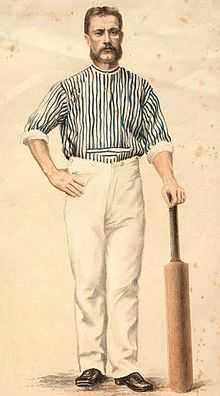Charles Bannerman
|
| ||||||||||||||||||||||||||||||||||||||||
| Personal information | ||||||||||||||||||||||||||||||||||||||||
|---|---|---|---|---|---|---|---|---|---|---|---|---|---|---|---|---|---|---|---|---|---|---|---|---|---|---|---|---|---|---|---|---|---|---|---|---|---|---|---|---|
| Full name | Charles Bannerman | |||||||||||||||||||||||||||||||||||||||
| Born |
3 July 1851 Woolwich, Kent, England | |||||||||||||||||||||||||||||||||||||||
| Died |
20 August 1930 (aged 79) Surry Hills, New South Wales, Australia | |||||||||||||||||||||||||||||||||||||||
| Batting style | Right-handed | |||||||||||||||||||||||||||||||||||||||
| Bowling style | Right-arm leg spin | |||||||||||||||||||||||||||||||||||||||
| Role | Umpire, coach | |||||||||||||||||||||||||||||||||||||||
| International information | ||||||||||||||||||||||||||||||||||||||||
| National side |
| |||||||||||||||||||||||||||||||||||||||
| Test debut (cap 1) | 15 March 1877 v England | |||||||||||||||||||||||||||||||||||||||
| Last Test | 4 January 1879 v England | |||||||||||||||||||||||||||||||||||||||
| Domestic team information | ||||||||||||||||||||||||||||||||||||||||
| Years | Team | |||||||||||||||||||||||||||||||||||||||
| 1870–88 | New South Wales | |||||||||||||||||||||||||||||||||||||||
| Umpiring information | ||||||||||||||||||||||||||||||||||||||||
| Tests umpired | 12 (1887–1902) | |||||||||||||||||||||||||||||||||||||||
| Career statistics | ||||||||||||||||||||||||||||||||||||||||
| ||||||||||||||||||||||||||||||||||||||||
| Source: , 20 August 1930 | ||||||||||||||||||||||||||||||||||||||||
Charles Bannerman (3 July 1851 – 20 August 1930) was an Australian Test cricketer, a right-handed batsman, who played domestic cricket for New South Wales.
Early life
Bannerman was born in Woolwich, Kent, England, son of William Bannerman and his wife Margaret, née Murphy. Not long afterwards the family migrated to New South Wales. He joined Warwick Cricket Club in Sydney.[1] He first played first-class cricket in 1870–71, and came to prominence by scoring 81 and 32 not out against Victoria in 1874.
Test matches

Bannerman played in the first three matches that were later designated as Test matches. The first of these, between Australia and England was held at the Melbourne Cricket Ground (MCG) in March 1877 and Australia batted first. Bannerman opened the Australian innings and is thus retrospectively deemed to have had the honour of facing the first ball ever bowled in Test cricket (the bowler being England's Alfred Shaw) and scoring the first ever run in Test cricket. Dropped before he reached double figures, he went on to score 165 when he was forced to retire hurt, his finger having been broken by a ball from George Ulyett. Again retrospectively, his innings was the first-ever Test century. It remains the highest score by an Australian batsman on debut and his 165 runs, out of Australia's total of 245, is still the highest proportion (67.35%) of a completed innings in a Test match. No other Australian exceeded 20 in either innings, as Australia won the match by 45 runs. For his feat, spectators at the match collected £83 7s 6d to present to him. Bannerman played in two more matches now recognised as Tests, the second in 1877 and the one in 1879. His Test record is 239 runs at an average of 59.75.
On the first official Australian tour of England in 1878, Bannerman topped the averages and scored the first century by an Australian in England, but no matches recognised as Tests were played on this tour. He had a career first-class batting record of 1,687 runs at 21.62. He did not represent Australia again, officially because of ill-health, but it was suggested that he could not cope with celebrity status, and that gambling debts and alcohol left him impoverished. He continued to play for New South Wales until 1888.
Umpiring
Between 1887 and 1902, Bannerman stood as umpire in 12 Test matches in Australia. His first match was between Australia and England at the Sydney Cricket Ground (SCG) from 28 January to 31 January 1887. England won by 13 runs after scoring only 45 runs in their first innings. His colleague was Henry Rawlinson, standing in his only Test match. Bannerman's last match, at Melbourne in the 1901–02 season, was also a close low-scoring affair with Australia winning by 32 runs. On this occasion his colleague was Bob Crockett standing in his first season as a Test umpire. In two of the matches in which Charles Bannerman officiated, his brother Alick was a player, but no accusations of bias could be made as Alick scored only 23 runs in four innings.
In the fifth Test of the 1897–98 series, Bannerman turned down a confident lbw appeal against Australian batsman Joe Darling when the match was in a tense situation. The lbw was reportedly "obvious" but the bowler had run in front of the umpire who was unsighted and had to reject the appeal. Darling, then on 50, went on to score 160 and Australia won the match. After the game Bannerman lodged an official complaint against the English wicket-keeper who had accused him of cheating, and the player was rebuked.
Benefit and family
In the 1922–23 season, the first radio broadcast of a cricket match anywhere in the world was a match played as a benefit for Charles Bannerman, from which he received £490.
He died in Sydney, survived by his widow Mary Ann, née King, two sons and three daughters; three of the children were the issue of his first marriage to Ellen, née Neale.
References
- ↑ M. Z. Forbes (1969). "Bannerman, Charles (1851–1930)". Australian Dictionary of Biography, Volume 3. MUP. pp. 86–87. Retrieved 2008-02-02.
Bibliography
- Harte, Chris (1993). A History of Australian Cricket. London: Andre Deutsch. ISBN 0-233-98825-4.
- Pollard, Jack, Australian Cricket: 1803–1893, The Formative Years. Sydney, The Book Company, 1995. (ISBN 0-207-15490-2)
- Pollard, Jack, Australian Cricket: 1893–1917, The Turbulent Years. Sydney, The Book Company, 1995. (ISBN 0-207-15468-6)
- Pollard, Jack, Australian Cricket: The Game and the Players. Sydney, Hodder & Stoughton, 1982. (ISBN 0-340-28796-9)
External links
| Records | ||
|---|---|---|
| Preceded by First holder |
World Record – Highest individual score in Test cricket 165 not out vs England at Melbourne 1876–77 |
Succeeded by Billy Murdoch |
| ||||||||||